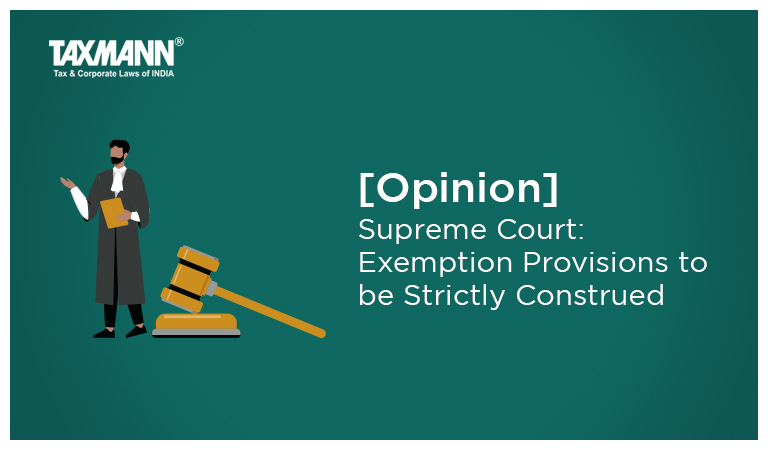[Opinion] Supreme Court: Exemption Provisions to be Strictly Construed
- Blog|News|Income Tax|
- 2 Min Read
- By Taxmann
- |
- Last Updated on 16 July, 2022

Rohan Sogani – [2022] 140 taxmann.com 298 (Article)
1. Introduction
1.1. As per Section 10B of the Income Tax Act, 1961 (“ITA”), profits and gains derived by a 100% Export Oriented Unit from the export of article or things or computer software, is eligible for deduction under such section, for a period of ten consecutive assessment years. Benefit of Section 10B cannot be claimed from Assessment Year 2012-13. Section 10B(8) provides that an assessee can choose to not apply the provisions of Section 10B for any assessment year by filing a declaration in this regard to the Assessing Officer before the due date of furnishing Return of Income (“ROI”) under Section 139(1), in which case provisions of Section 10B would not apply.
1.2. Supreme Court, in the case of Pr. CIT v. Wipro Limited, [2022] 140 taxmann.com 223 (SC), vide order dated 11.07.2022, rejected the claim of the assessee made by way of revised return with respect to exemption claimed under Section 10B and carry forward of losses. Supreme Court in clear terms held that for claiming exemption under Chapter III of the ITA, the requirements as provided therein, have to be complied with strictly.
1.3. The proposition that certain procedural requirements, such as of filing declarations, forms by the assessee, for claiming exemption, being declaratory in nature, was rejected. Supreme Court also reiterated the position that revision of return of income is only possible in case of error or omission on the part of the assessee and not otherwise.
2. Facts of the Case
2.1. In this case, assessee was a 100% Export Oriented Unit, engaged in the business of running a Call Centre and IT Enabled and Remote Processing Services. Assessee was thus entitled to claim exemption under Section 10B of the ITA. Assessee filed its ROI for AY 2001-02, within the time limit prescribed under Section 139(1) (“original return“). In such original return, exemption under Section 10B was claimed by the assessee and accordingly, no loss was carried forward.
2.2. Subsequent to filing the original return, but before completion of the assessment, assessee filed a declaration before the Assessing Officer, in terms of Section 10B(8), wherein, exemption claimed under Section 10B was withdrawn. Thereafter, a revised ROI was filed by the assessee, in which exemption under Section 10B was not claimed. This resulted into loss being claimed by the assessee in the revised ROI, which was sought to be carried forward under Section 72.
2.3. Claim of the assessee by way of revised return and also carry forward of losses was denied during assessment proceedings and also in the first appellate proceedings, for the reason that the declaration under Section 10B(8) was filed after the due date of filing the return of income. However, such claim was allowed by Income Tax Appellate Tribunal and by the High Court. Thereafter, appeal was preferred by the Department before the Supreme Court.
Click Here To Read The Full Article
Disclaimer: The content/information published on the website is only for general information of the user and shall not be construed as legal advice. While the Taxmann has exercised reasonable efforts to ensure the veracity of information/content published, Taxmann shall be under no liability in any manner whatsoever for incorrect information, if any.

Taxmann Publications has a dedicated in-house Research & Editorial Team. This team consists of a team of Chartered Accountants, Company Secretaries, and Lawyers. This team works under the guidance and supervision of editor-in-chief Mr Rakesh Bhargava.
The Research and Editorial Team is responsible for developing reliable and accurate content for the readers. The team follows the six-sigma approach to achieve the benchmark of zero error in its publications and research platforms. The team ensures that the following publication guidelines are thoroughly followed while developing the content:
- The statutory material is obtained only from the authorized and reliable sources
- All the latest developments in the judicial and legislative fields are covered
- Prepare the analytical write-ups on current, controversial, and important issues to help the readers to understand the concept and its implications
- Every content published by Taxmann is complete, accurate and lucid
- All evidence-based statements are supported with proper reference to Section, Circular No., Notification No. or citations
- The golden rules of grammar, style and consistency are thoroughly followed
- Font and size that’s easy to read and remain consistent across all imprint and digital publications are applied



 CA | CS | CMA
CA | CS | CMA
